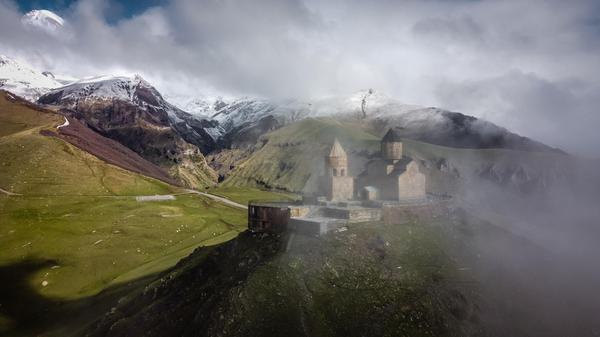Introduction to Georgian History and Cultural Heritage
Georgia, a country nestled at the crossroads of Eastern Europe and Western Asia, boasts a rich and diverse history that has shaped its unique culture and traditions. With roots stretching back to prehistoric times and a fascinating tapestry of influences from various civilizations, Georgia's cultural heritage is a testament to its resilience and adaptability. As one delves into the intriguing depths of Georgian history, it becomes apparent that understanding the country's past is crucial to appreciating its present. From ancient kingdoms to its modern-day cultural renaissance, Georgia's heritage continues to play a vital role in defining its identity, offering valuable insights into the life, beliefs, and aspirations of its people.
Prehistoric and Ancient Civilizations in Georgia
Early Human Settlements
Georgia's history dates back to the earliest days of human civilization, with archaeological sites such as Dmanisi and Shulaveri-Shomu providing evidence of human settlements from as far back as 1.8 million years ago and the Neolithic period, respectively. These early communities laid the groundwork for the development of Georgia's diverse and complex culture.
The Kingdoms of Colchis and Iberia
Two ancient Georgian kingdoms, Colchis and Iberia, emerged around the 6th century BCE and became prominent regional powers. Colchis, located in present-day western Georgia, was known for its wealth and the myth of the Golden Fleece. Iberia, occupying eastern and southern Georgia, developed a sophisticated political system and played a crucial role in regional trade and diplomacy.
The Influence of Greek, Persian, and Roman Empires
Throughout its history, Georgia has been a meeting point for various empires and cultures. The Greek, Persian, and Roman empires all left their mark on the region, contributing to the development of its art, architecture, and religious beliefs. These interactions resulted in a rich cultural fusion that is still evident in Georgia's archaeological sites, traditions, and historical narratives.
The Role of Christianity in Georgian History
Adoption of Christianity in the 4th Century
The introduction of Christianity in Georgia played a pivotal role in shaping the nation's history and cultural identity. Georgia was one of the first countries to adopt Christianity as a state religion, in the early 4th century, under the rule of King Mirian III. This event marked a significant turning point in Georgian history, leading to the development of a unique Christian culture that has endured for centuries.
The Georgian Orthodox Church and Its Impact on Society
The Georgian Orthodox Church has been a central institution in Georgian society, influencing various aspects of life, from education to politics. The Church preserved the Georgian language and literary tradition during periods of foreign occupation and contributed to the development of a unique artistic style in religious art and architecture. Moreover, it played a vital role in unifying the Georgian people and maintaining their national identity.
Iconic Religious Architecture and Artifacts
Georgia's religious history is evident in its stunning array of churches, monasteries, and religious artifacts. Some of the most famous examples include the Svetitskhoveli Cathedral, Jvari Monastery, and Gelati Monastery, which showcase the evolution of Georgian ecclesiastical architecture. Additionally, the country is home to numerous religious treasures, such as ancient icons, frescoes, and illuminated manuscripts, reflecting the importance of Christianity in Georgia's cultural heritage.
The Golden Age of Georgian culture
The Reign of King David the Builder and Queen Tamar
The Golden Age of Georgian culture spanned the late 11th to early 13th centuries, coinciding with the reigns of King David the Builder and Queen Tamar. During this period, Georgia reached its political, economic, and cultural zenith, becoming one of the most powerful kingdoms in the region. The wise and progressive rule of these revered monarchs paved the way for a flourishing cultural scene that left a lasting impact on the country.
Flourishing of Arts, Literature, and Science
The Golden Age saw an unprecedented surge in the arts, literature, and science, as the Georgian kingdom enjoyed peace, stability, and prosperity. Masterpieces of Georgian literature, such as Shota Rustaveli's epic poem "The Knight in the Panther's Skin," emerged during this time. The period also witnessed the construction of magnificent architectural marvels, like the Gelati Monastery and Academy, which functioned as a vital center of learning and scholarship.
The Development of a Unique Georgian Script
The Golden Age of Georgian culture was also marked by the development and refinement of the unique Georgian script. Georgia has three distinct scripts—Asomtavruli, Nuskhuri, and Mkhedruli—which were used to transcribe the Georgian language in different historical periods. During the Golden Age, the Mkhedruli script evolved into its present form, contributing to the preservation and enrichment of Georgian literary heritage and becoming an essential element of Georgia's cultural identity.
The impact of foreign invasions and occupations
Mongol, Ottoman, and Persian Invasions
Georgia's strategic location at the crossroads of Europe and Asia made it an attractive target for foreign invaders throughout history. Following the Golden Age, the country faced numerous invasions and occupations, including those by the Mongols in the 13th century, the Ottomans in the 16th century, and the Persians in the 17th and 18th centuries. These invasions brought devastation, economic hardship, and political fragmentation to the once-prosperous kingdom.
Russian Annexation and Influence
The 19th century saw Georgia being annexed by the Russian Empire, which brought about another period of foreign influence and control. Under Russian rule, Georgian culture was suppressed, and the Georgian Orthodox Church lost much of its independence. Despite these challenges, the Georgian intelligentsia persisted in their efforts to preserve their cultural heritage, laying the groundwork for a national awakening.
Resilience and Preservation of Georgian Culture
Throughout the centuries of foreign domination, Georgian culture displayed remarkable resilience. The people of Georgia managed to preserve their language, religious traditions, and cultural identity in the face of adversity. This tenacity is a testament to the strength and vibrancy of Georgian culture, which has managed to endure and adapt to changing circumstances. Today, Georgia's rich cultural heritage serves as a source of pride and inspiration for its people, as they continue to build a modern and independent nation.
Georgia's Fight for Independence and Its Modern-Day Cultural Renaissance
The Struggle for Independence in the 20th Century
The 20th century saw Georgia engaged in a long struggle for independence. The country experienced a brief period of freedom following the Russian Revolution in 1917, which led to the establishment of the Democratic Republic of Georgia in 1918. However, this newfound independence was short-lived, as Georgia was forcibly incorporated into the Soviet Union in 1921. For the next seven decades, Georgia would remain a part of the USSR, enduring Soviet rule and its impact on the nation's culture and identity.
The Establishment of the Democratic Republic of Georgia
In the late 1980s and early 1990s, the Soviet Union began to collapse, and Georgia seized the opportunity to regain its independence. In 1991, Georgia declared its independence from the USSR, and a new era of nation-building began. The newly established Republic of Georgia faced many challenges in its early years, including political instability, economic hardship, and regional conflicts.
Revival of Georgian Culture in Post-Soviet Georgia
Despite the obstacles, post-Soviet Georgia has experienced a cultural renaissance. The country has worked diligently to reassert its unique identity, reviving and promoting traditional Georgian arts, literature, and architecture. This cultural revival has been accompanied by a renewed interest in Georgia's rich history and a commitment to preserving and celebrating its heritage. Today, Georgia's vibrant cultural scene reflects the resilience and creativity of its people, who have managed to overcome adversity and forge a new path for their nation.
Conclusion: Preserving and Celebrating Georgian Heritage
Preserving Georgia's rich history and cultural heritage is essential for future generations to understand and appreciate the nation's unique identity. By safeguarding its historic landmarks, artifacts, and traditions, Georgia ensures that its diverse cultural legacy remains accessible and relevant in a rapidly changing world.
Georgia is home to several UNESCO World Heritage Sites, including the historical monuments of Mtskheta, the ancient city of Kutaisi, and the unique cave city of Uplistsikhe. These sites, along with numerous other historical and cultural landmarks, are carefully protected and maintained by national and local authorities. In addition, the Georgian government is committed to supporting the preservation and promotion of the country's intangible cultural heritage, such as traditional music, dance, and crafts.
By preserving and celebrating its rich history and cultural heritage, Georgia invites visitors from around the world to explore and appreciate the depth and diversity of its past. From ancient ruins and medieval churches to vibrant festivals and traditional customs, Georgia offers a wealth of opportunities for travelers to immerse themselves in the country's unique cultural landscape. In doing so, they not only contribute to the ongoing preservation efforts but also help to strengthen Georgia's position as a proud and distinct nation on the world stage.

 Bronze Age in Georgia
Bronze Age in Georgia
 Golden Age of Georgia
Golden Age of Georgia
 Ancient Cultures of Prehistoric Georgia
Ancient Cultures of Prehistoric Georgia
 Bagrationi Dynasty
Bagrationi Dynasty
 Mongol Invasions of Georgia
Mongol Invasions of Georgia
 Early Inhabitants of Georgia
Early Inhabitants of Georgia
 Prehistoric Georgian Archaeological Sites
Prehistoric Georgian Archaeological Sites
 Economic Reforms in Georgia
Economic Reforms in Georgia
 Rose Revolution
Rose Revolution
 Modern Culture and Society in Georgia
Modern Culture and Society in Georgia
 NATO and EU Aspirations of Contemporary Georgia
NATO and EU Aspirations of Contemporary Georgia









